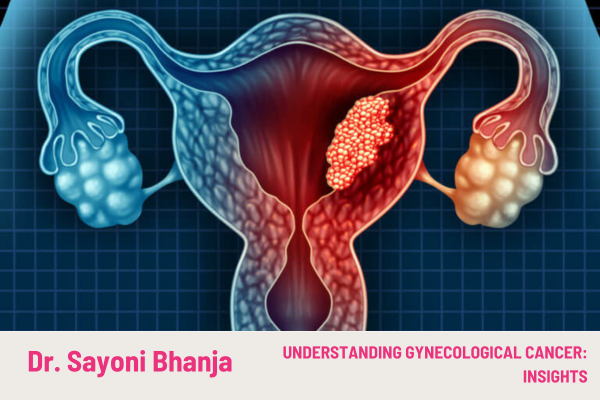Understanding Gynecological Cancer: Insights
10/2/20242 min read


Gynecological cancer encompasses a range of cancers that affect a woman’s reproductive system. These include cancers of the ovaries, uterus, cervix, vulva, and vagina. Each type of gynecological cancer presents unique challenges and requires specific treatment approaches. As a leading medical oncologist in Kolkata, Dr. Sayoni Bhanja offers expert insights into understanding, diagnosing, and managing gynecological cancers.
Types of Gynecological Cancer
Ovarian Cancer: Ovarian cancer originates in the ovaries and is often diagnosed at a later stage due to its subtle symptoms. Early signs may include abdominal bloating, pelvic pain, and frequent urination. Risk factors include family history, age, and genetic mutations such as BRCA1 and BRCA2.
Uterine Cancer: Also known as endometrial cancer, it starts in the lining of the uterus. Symptoms often include abnormal bleeding, pelvic pain, and pain during intercourse. Risk factors include obesity, hormone replacement therapy, and certain genetic conditions.
Cervical Cancer: This type begins in the cells of the cervix. It is most commonly caused by the human papillomavirus (HPV). Early symptoms may be minimal, but advanced stages can present with abnormal vaginal bleeding, pelvic pain, and unusual discharge.
Vulvar Cancer: Originating in the external genitalia, vulvar cancer symptoms may include itching, lumps, or sores on the vulva. Risk factors include HPV infection, smoking, and chronic vulvar irritation.
Vaginal Cancer: This rare cancer affects the vaginal walls. Symptoms may include abnormal bleeding, discharge, and pain during intercourse. Risk factors include HPV infection and exposure to certain chemicals.
Recognizing the Symptoms
Identifying gynecological cancer early can significantly impact treatment success and survival rates. Women should be vigilant for any of the following symptoms, especially if they persist for more than a few weeks:
Unusual bleeding or discharge
Persistent pelvic pain or pressure
Abdominal bloating or swelling
Pain during intercourse
Changes in urinary or bowel habits
Diagnosis and Treatment
Diagnosis typically involves a combination of physical examinations, imaging tests (such as ultrasound or CT scans), blood tests, and biopsies. Each type of gynecological cancer may require a specific diagnostic approach to confirm the presence and extent of the disease.
Treatment for gynecological cancer often includes:
Surgery: To remove cancerous tissues or organs.
Radiation Therapy: To target and kill cancer cells.
Chemotherapy: To destroy cancer cells throughout the body.
Hormone Therapy: To block or remove hormones that fuel certain cancers.
Targeted Therapy: To target specific cancer cells with less harm to normal cells.
Dr. Sayoni Bhanja emphasizes a personalized approach to treatment, considering factors such as the cancer type, stage, and patient’s overall health. She works closely with her patients to design a treatment plan tailored to their specific needs and circumstances.
Prevention and Early Detection
While some risk factors for gynecological cancer cannot be changed, such as age and genetics, lifestyle modifications can help reduce risk. Dr. Sayoni Bhanja recommends the following preventive measures:
Regular Gynecological Exams: Regular check-ups can help detect early signs of gynecological issues.
HPV Vaccination: Protects against HPV, a major cause of cervical cancer.
Healthy Lifestyle: Maintaining a healthy weight, avoiding smoking, and limiting alcohol consumption can reduce cancer risk.
Genetic Testing: For those with a family history of gynecological cancers, genetic testing may provide insight into personal risk.
Conclusion
Gynecological cancer is a serious condition, but early detection and treatment offer the best chances for a successful outcome. Dr. Sayoni Bhanja, a top medical oncologist in Kolkata, provides comprehensive care and support to women facing these challenges. Her expertise and personalized approach ensure that each patient receives the best possible care and guidance throughout their cancer journey.
If you have concerns about gynecological cancer or need expert guidance, don’t hesitate to consult Dr. Sayoni Bhanja for a thorough evaluation and tailored treatment plan.
